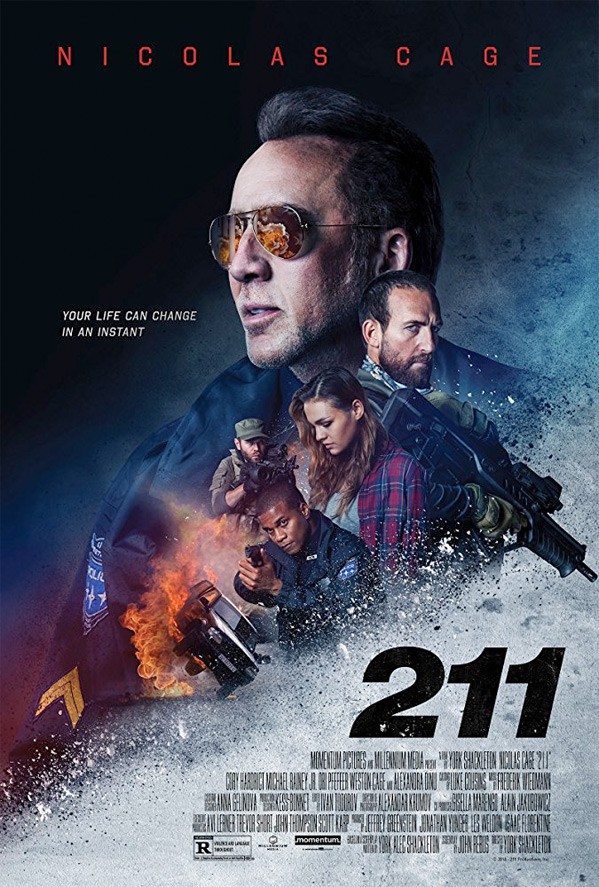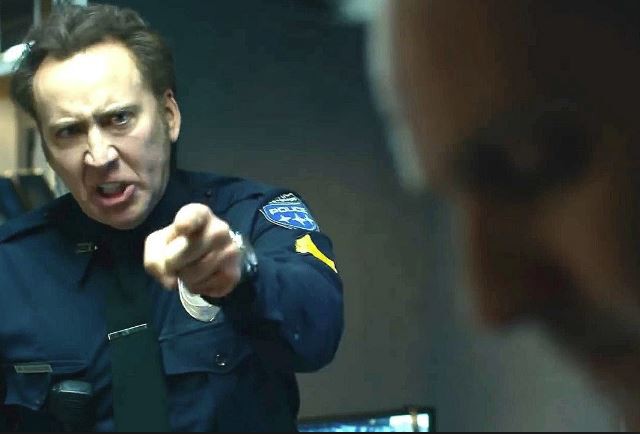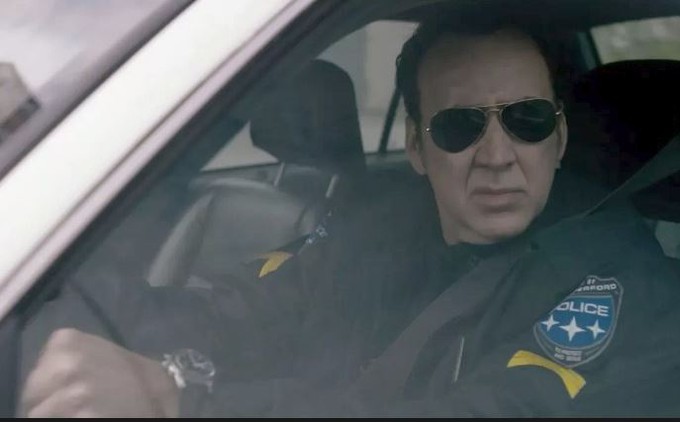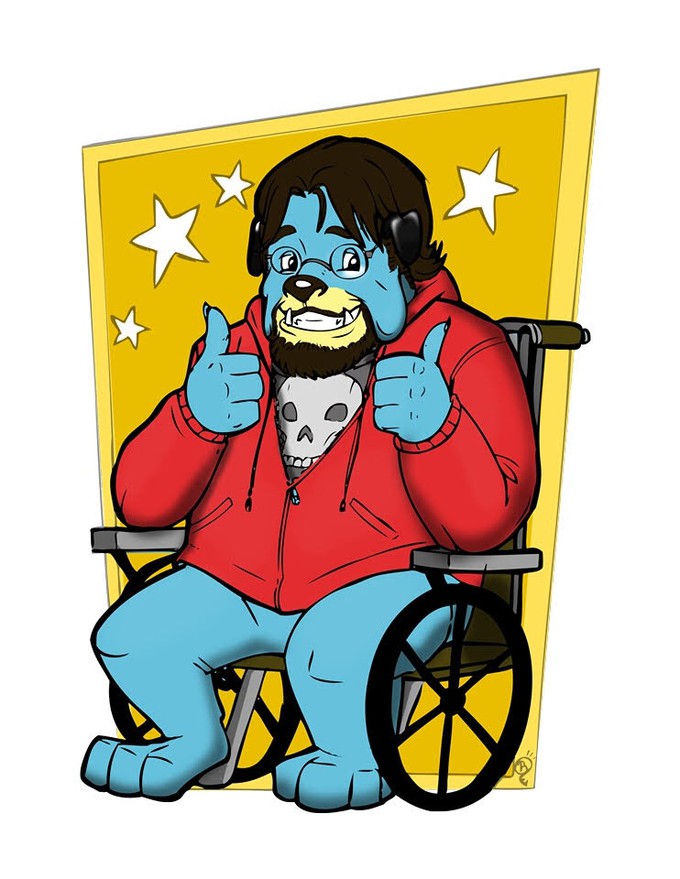
This Friday, from Momentum Pictures, comes the latest project from Academy Award winner and pop culture Icon, Nicolas Cage. The filmed is titled 211 (‘211’ is police code for ‘a robbery in progress’). The plot involves a police officer (played by Cage) who gets caught up in a bank robbery attempt while he has a high school student doing a ride along with him. The film’s story is said to be inspired by one of "longest and bloodiest bank heists in history".
The film is directed by York Shackleton (1 Out Of 7). Shackleton is a former professional snowboarder turned actor. During his acting career, he was featured in projects like I KNOW WHAT YOU DID LAST SUMMER and MTV’s UNDRESSED. Shackleton took the next, logical step into directing. Starting with short films, documentaries, and dramas, Shackleton has now, with 211, taken on the action genre with a film that has been called “a cross between BLACKHAWK DOWN and END OF WATCH”.
I had the opportunity recently to chat briefly with York Shackleton about Nicolas Cage, filming in Eastern Europe, and their new film, 211!
Now onto the interview. Enjoy!

Wheels: How did Nicolas Cage become involved with 211?
York Shackleton: Nicolas Cage had worked with the studio several times in the past. They had done many movies together. So, they had been wanting to work with him [again]. He was, at that point in his career, looking for a certain type of performance he wanted to do. So, when he got the screenplay, he was drawn to it. I was set up to go have a meeting with him. Which is obviously very flattering. I was honored and felt very fortunate to have that opportunity. So, I went and met with him and we very quickly hit it off; diving into what we wanted to do with his character. We both agreed that we wanted a very internalized performance. [Nicolas Cage] does a lot of stuff that is very ‘outside the box’ and very big. That’s a lot of what he’s become known for especially recently. The truth is he is a VERY strong actor and can really do anything that is asked of him as long as he understands and agrees with it. Very quickly, we realized we were both on the same page with where we wanted to go with [the film]. So, he said he was going to do it, which was a really cool experience.
W: What was the experience like working with him?
YS: So when we went to work since we already had that connection with the material, we were staying true to that all the way through [filming]. It made for a great experience while shooting because both of us would come together and we would discuss a lot of situations, situations I had been through or he had been through – the people around had been through. We would derive a lot of the humanity, the kind of internal struggles these people were dealing with and we tried to bring that to life and to the screen through experiences that we had been through that people can relate to.
W: Millennium Films shoots a lot of their productions in Bulgaria. What are some of the complications and benefits of filming in Bulgaria?
YS: The reason we [went] to Bulgaria is that the studio owns a very large facility over there. They’ve got the ability to get an enormous amount of production support. So with that, obviously, going to a foreign country there are going to be certain obstacles. The language barrier was a very big part of that. You’ve got some very, VERY talented people in those eastern European countries. They’ve been making films, over there, for many years with the Russian studios. There’s decades of experience, even generational experience, that’s been handed down.
It’s very interesting to see how these people have adapted to do their own unique, subtle things that are very different than how we do things in the United States. You obviously think of the United States, and especially Los Angeles, as the primary epicenter of filmmaking but there are so many places around the world that have their own, equally strong, internal infrastructure of how they are making films with their own style that is specific to that region.
W: As you have experience with both, what is one of the main differences of Bulgarian-style productions when compared to L.A.-based ones?
YS: The mindset mainly, the mindset, that the people are in when they are working. I think that here in the United States everyone has gotten use to a certain set of rules; how long you can work, the style of how certain crews work, the types of sub-categories they have underneath them. For example, the cinematography departments overseas are very different from how they are in the United States. Because the people over there don’t have as many opportunities, as they would in the U.S., they tend to work much harder. I would say they are much more inspired, and only slightly less experience than [crews] in the United States
W: You have very impressive gunplay and stunt work in 211. Can you speak on how that was achieved on the modest production budget?
YS: I definitely have to give a lot of that to the studio. That is one of the strengths you get from shooting in Bulgaria. Most of the films [those crews] do are based in this type of genre. So, they have a lot of experience in the specific ‘action’ area. You can get away with a lot more stuff as far as guns and the availability for props. That all lends itself to some really great stunt crews, some really great coordinators. When we set out to do this film, it was a progression for me. I had been doing a lot of dramatic films and documentary work. The reason I was choosing those subjects as a young filmmaker starting out without a lot of money, I really wanted to be able to use my skills as a filmmaker to do what we do… which is move people emotionally. So, everything I do goes back to that same point. I was choosing subjects that I felt like [where even though I didn’t have] a lot of money I could still convey a really strong emotional story. After a few of those and gaining that level of experience, I wanted to continue to progress forward. We’ve made these movies for a really good price. They look a lot bigger [budget-wise] than what they are. So, let’s see where we can take that too. We thought that [an] action [film] would give us a great opportunity to start to expand that side of the storytelling, more of the visual. That’s how [my choice to make 211] came together. It was more of an analytical thought process of what we wanted to accomplish and how to do something like that for a really great price… utilizing the resources that we had around us.
W: What’s the one aspect of 211 that you are most proud of?
YS: That we got it done. [laughs] For any filmmaker, you set out on that experience to make a movie and there is just so many obstacles… and so many things to deal with during the process. That’s what I think my job as a filmmaker is; to always be looking at the overall [situation] and never getting caught up in the singular moment of anything. If you stick to that, you can really stay true to what the vision is and drive all the way through. In today’s world, a lot of things can fall apart. So, the fact that you can get this far with a movie, it’s pretty difficult. I’m just so proud to have this many opportunities to do it and progress forward …and having these opportunities as well to talk with guys like you who are really the whole reason we can make these films in the first place.
W: York, thank you so much for your time today. Good luck with the release of 211!
YS: I appreciate it! I am a big fan of your site. Thank you!

211 drops into theaters, VOD and Digital HD on June 8th
-Wheels

